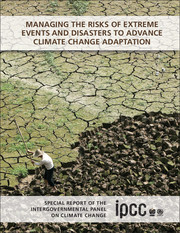 Managing the Risks of Extreme Events and Disasters to Advance Climate Change Adaptation
Managing the Risks of Extreme Events and Disasters to Advance Climate Change Adaptation Summary for Policymakers
from Section II
Published online by Cambridge University Press: 05 August 2012
Summary
Context
This Summary for Policymakers presents key findings from the Special Report on Managing the Risks of Extreme Events and Disasters to Advance Climate Change Adaptation (SREX). The SREX approaches the topic by assessing the scientific literature on issues that range from the relationship between climate change and extreme weather and climate events (‘climate extremes’) to the implications of these events for society and sustainable development. The assessment concerns the interaction of climatic, environmental, and human factors that can lead to impacts and disasters, options for managing the risks posed by impacts and disasters, and the important role that non-climatic factors play in determining impacts. Box SPM.1 defines concepts central to the SREX.
The character and severity of impacts from climate extremes depend not only on the extremes themselves but also on exposure and vulnerability. In this report, adverse impacts are considered disasters when they produce widespread damage and cause severe alterations in the normal functioning of communities or societies. Climate extremes, exposure, and vulnerability are influenced by a wide range of factors, including anthropogenic climate change, natural climate variability, and socioeconomic development (Figure SPM.1). Disaster risk management and adaptation to climate change focus on reducing exposure and vulnerability and increasing resilience to the potential adverse impacts of climate extremes, even though risks cannot fully be eliminated (Figure SPM.2). Although mitigation of climate change is not the focus of this report, adaptation and mitigation can complement each other and together can significantly reduce the risks of climate change. [SYR AR4, 5.3]
- Type
- Chapter
- Information
- Managing the Risks of Extreme Events and Disasters to Advance Climate Change AdaptationSpecial Report of the Intergovernmental Panel on Climate Change, pp. 3 - 22Publisher: Cambridge University PressPrint publication year: 2012
- 84
- Cited by


